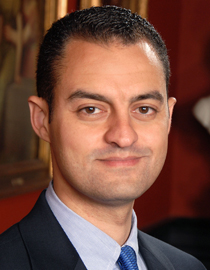
Dr. Yossef Elabd, professor in the Artie McFerrin Department of Chemical Engineering at Texas A&M University, has developed two fuel cell vehicle platforms for both present day enhancements and future innovation.
Image: Texas A&M University
The Electrochemical Society’s Yossef A. Elabd is using electrochemical science to work toward global sustainability with his new advancements in fuel cell car technology.
Elabd, an active member of ECS’s Battery Division, has developed two fuel cell vehicle platforms for both present day enhancements and future innovation – focusing not only on the science, but also the environment.
“I just want to drive my car with water vapor coming out the back of it,” Elabd said.
With this new technology and initiatives such as the ECS Toyota Young Investigator Fellowship, Elabd’s statement may become an achievable reality for many people in the near future.
The idea of the fuel cell vehicle is every environmentalist’s dream, but the current issues deal with the sustainability of the vehicle. The current fuel cell car uses a proton exchange membrane (PEM) electrolyte for its platinum-based electrodes.
This from Texas A&M University:
Elabd has discovered that the amount of platinum needed for electrode manufacturing can be significantly reduced, and thus the production costs dramatically minimized. His patent-pending research establishes that a fuel cell can perform optimally with only 16 percent of its previous platinum requirements. New polymer nanofiber-platinum nanoparticle electrodes are reliable and enduring.
But Elabd is going further by looking toward creating a fuel cell car that does not require platinum. Scientists working with fuel cells have consistently run into issue with chemical degradation in the introduction of a polymer to an alkaline exchange membrane, but Elabd and his group at Texas A&M University have found a breakthrough.
Their patented development produces a polymer electrolyte that is chemical stable to the hydroxide ions, which move the ions across the fuel cell super efficiently.
“The same material if modified a little bit can be used in batteries as a replacement to current lithium-ion charged batteries, making it a solid state with the benefit of longer stability and much increased safety,” Elabd said.
Both solutions have passed the proof concept phase.
Make sure to join Elabd and other brilliant scientific minds by becoming a member of ECS today!

